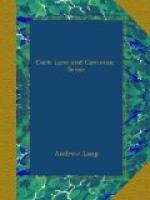About a wilderness of other phenomena, attested by scores of sane people, from Lord Crawford to Mr. S. C. Hall, Dr. Carpenter ’left himself no time to speak’ (p. 105). This was convenient, but the lack of time prevented Dr. Carpenter from removing our stumbling-block, the one obstacle which keeps us from adopting, with no shadow of doubt, the theory that explains all the marvels by the survival and revival of savage delusions. Dr. Carpenter’s hypothesis of expectancy, of a dominant idea, acting on believers, in an ambiguous state, and in the dark, can do much, but it cannot account for the experience of wide-awake sceptics, under the opposite dominant idea, in a brilliant light.
Dr. Carpenter exposed and exploded a quantity of mesmeric spiritualistic myths narrated by Dr. Gregory, by Miss Martineau, and by less respectable if equally gullible authorities. But, speaking merely as perplexed and unconvinced students of argument and evidence, we cannot say that he removed the difficulties which have been illustrated and described.
Table-turning, after what is called a ‘boom’ in 1853-60, is now an abandoned amusement. It is deserted, like croquet, and it is even less to be regretted. But its existence enabled disputants to illustrate the ordinary processes of reasoning; each making assertions up to the limit of his personal experience; each attacking, as ‘superstitious,’ all who had seen, or fancied they had seen, more than himself, and each fighting gallantly for his own explanatory hypothesis, which never did explain any phenomena beyond those attested by his own senses. The others were declared not to exist, or to be the result of imposture and mal-observation,—and perhaps they were.
The truly diverting thing is that Home did not believe in the other ‘mediums,’ nor in anything in the way of a marvel (such as matter passing through matter) which he had not seen with his own eyes. Whether Home’s incredulity should be reckoned as a proof of his belief in his own powers, might be argued either way.
THE GHOST THEORY OF THE ORIGIN OF RELIGION
Evolutionary Theory of the Origin of Religion. Facts misunderstood suggest ghosts, which develop into gods. This process lies behind history and experience. Difficulties of the Theory. The Theory of Lucretius. Objections Mr. Tyler’s Theory. The question of abnormal facts not discussed by Mr. Tylor. Possibility that such ‘psychical’ facts are real, and are elements in development of savage religion. The evidence for psychical phenomena compared with that which, in other matters, satisfies anthropologists. Examples. Conclusion.




